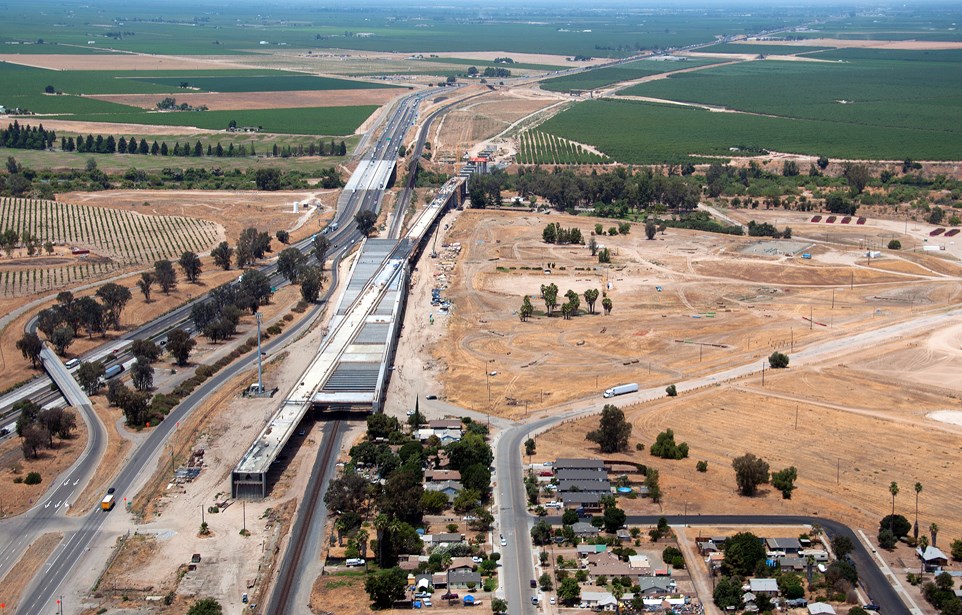The Trump Administration is trying to cut off funds for California High-Speed Rail.
Yesterday, in a letter to the California HSR Authority and Governor Gavin Newsom, the Federal Railroad Administration asserted that CAHSRA “failed to make reasonable progress,” so the feds are planning to pull back $929 million allocated to the project. Per a press announcement, the FRA is also "actively exploring every legal option" to yank an additional $2.5 billion in federal funds "previously granted for this now-defunct project."
California's State Senator for San Francisco, Scott Wiener was quick to reply when the news broke:
California is 100% committed to a #HighSpeedRail network from Sacramento to San Diego. The President is lying about what Governor Newsom said & what our progress has been. We will fight this illegal action with everything we have. This is about California’s future. https://t.co/83dluXAk1T
— Senator Scott Wiener (@Scott_Wiener) February 20, 2019
This move to yank federal funding is highly political. California is suing the feds over various administration actions, from the border wall to the Census. The feds may be looking for ways to retaliate.
Federal, state, and county funding agencies typically bend over backwards to allow infrastructure projects to adjust timelines, scopes, designs, etc., due to various unanticipated circumstances. Projects that fail to make reasonable progress are routinely granted extensions. The federal government basically never exercises the same sort of scrutiny toward highway expansion projects, which regularly fail to meet their scope, timeline, and/or budget - as well as failing to deliver projected traffic congestion or pollution reductions promised under the archaic Level of Service traffic analysis.
CA HSR, like pretty much all mega-projects, is well over budget. Though the reports of its death have been greatly exaggerated.
In 2008, California voters approved an initial $10 billion for a high-speed rail network then expected to cost around $40 billion. At that time, it was anticipated that state monies would likely be supplemented by private and federal funding. Private high-speed rail partners are common in Europe and Japan. Federal funding commonly comprises the vast majority of U.S. transportation network investments, including providing 90 percent of the budget for the nation's early highway network.
Under the Obama administration, the feds kicked in $3.5 billion for California's HSR. Private funding has yet to emerge. Governor Jerry Brown, a strong supporter of rail modernization, steered additional state funding to the project, including greenhouse gas reduction cap-and-trade funds. To date, state funding for the project totals about $13-14 billion.
While the route details were still being finalized, construction got underway in early 2015 in California's Central Valley. There are 119 miles of CA High-Speed Rail currently under construction.
With property acquisition and construction underway, as well as some lawsuits, costs have risen. In 2018, the CAHSRA estimated it would cost $77 billion to extend HSR from L.A. to San Francisco.
Last week, Newsom delivered his first State of the State address. In it, he sought to distance himself from his predecessor, signaling that rail would be less of a priority. Newsom stated that "Right now, there simply isn’t a path to get [high-speed rail] from Sacramento to San Diego, let alone from San Francisco to L.A." but then committed to finishing construction on the initial 150-mile segment from Merced to Bakersfield. Newsom also said that the state would finalize environmental clearance from S.F. to L.A., and would, as has been the case all along, continue to seek additional funds to complete the project.
The media then had a field day getting the story wrong, with various flavors of Newsom "abandons" "scraps" "slams brakes on" high-speed rail.
The stories were so wrong, that Newsom issued various reassurances the following day, including tweeting "We’re going to make high-speed rail a reality for California."
In the speech, Newsom also said he was "not interested in sending $3.5 billion in federal funding that was allocated to this project back to Donald Trump." The misleading headlines, plus his taunt, sparked a Twitter exchange. The president tweeted "California has been forced to cancel the massive bullet train project... They owe the Federal Government three and a half billion dollars. We want that money back now." Newsom tweeted back "We’re building high-speed rail, connecting the Central Valley and beyond. This is CA’s money, allocated by Congress for this project. We’re not giving it back."
Whether or not the feds can take back any of the money previously allocated Congress is at best unclear. Ethan Elkind, director of the Climate Program at UC Berkeley Law School, states that there is no precedent for the feds revoking transportation dollars at this scale.
California has to March 5 to challenge the FRA's decision.
Elkind suggests that the dispute could go to some sort of administrative resolution process, then to the courts. He states that, though the project is behind on its anticipated schedule, it is premature to conclude that CAHSRA has definitely failed a 2022 deadline as the FRA letter asserts.
Though the matter may end up in court, the conflict and its resolution are fundamentally political. Political and legal wrangling can delay projects and increase costs. Karen Frick, Co-Director of the University of California Transportation Center at the University of California in Berkeley, likens it to the delays and cost overruns that resulted from arguing over the design for the Oakland Bay Bridge Eastern span project. That highway project was delayed some two years and ultimately came in 26-times over budget. When it comes to mega-projects, she told Streetsblog, "We don’t talk about the extra time, the transaction costs--time is money as the adage goes."






